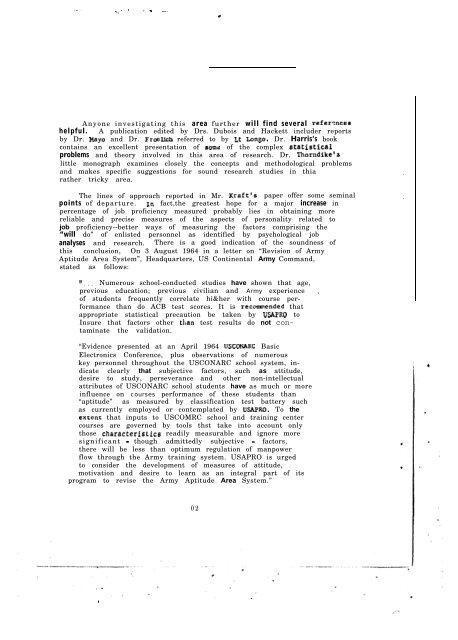Technical Report - International Military Testing Association
Technical Report - International Military Testing Association
Technical Report - International Military Testing Association
You also want an ePaper? Increase the reach of your titles
YUMPU automatically turns print PDFs into web optimized ePapers that Google loves.
. . .-.<br />
._ .<br />
.<br />
-. -.<br />
Anyone investigating this area further will find several references<br />
helpful. A publication edited by Drs. Dubois and Hackett includer reports<br />
by Dr. tlayo and Dr. Froelfsh referred to by Lt Longo. Dr. Harris’s book<br />
contains an excellent presentation of soma of the complex statistfcal<br />
problems and theory involved in this area of research. Dr. Thorndike’a<br />
little monograph examines closely the concepts and methodological problems<br />
and makes specific suggestions for sound research studies in thia<br />
rather tricky area.<br />
The lines of approach reported in Mr. Kraft's paper offer some seminal<br />
points of departure. III fact,the greatest hope for a major increase in<br />
percentage of job proficiency measured probably lies in obtaining more<br />
reliable and precise measures of the aspects of personality related to<br />
job proficiency--better ways of measuring the factors comprising the<br />
“will do” of enlisted personnel as identified by psychological job<br />
analyses and research. There is a good indication of the soundness of<br />
this conclusion, On 3 August 1964 in a letter on “Revision of Army<br />
Aptitude Area System”, Headquarters, US Continental Army Command,<br />
stated as follows:<br />
. . . Numerous school-conducted studies have shown that age,<br />
previous education; previous civilian and Army experience \<br />
of students frequently correlate hi&her with course performance<br />
than do ACB test scores. It is recommended that<br />
appropriate statistical precaution be taken by USABRO to<br />
Insure that factors other than test results do not contaminate<br />
the validation.<br />
“Evidence presented at an April 1964 USCCMRC Basic<br />
Electronics Conference, plus observations of numerous<br />
key personnel throughout the USCONARC school system, indicate<br />
clearly that subjective factors, such as attitude,<br />
desire to study, perseverance and other non-intellectual<br />
attributes of USCONARC school students have as much or more<br />
influence on courses performance of these students than<br />
“aptitude” as measured by classification test battery such<br />
as currently employed or contemplated by USAPRO. To the<br />
extent that inputs to USCOMRC school and training center<br />
courses are governed by tools thst take into account only<br />
those cheracterfstics readily measurable and ignore more<br />
significant - though admittedly subjective - factors,<br />
there will be less than optimum regulation of manpower<br />
flow through the Army training system. USAPRO is urged<br />
to consider the development of measures of attitude,<br />
motivation and desire to learn as an integral part of its<br />
program to revise the Army Aptitude Area System.”<br />
.<br />
02<br />
c<br />
.<br />
.









